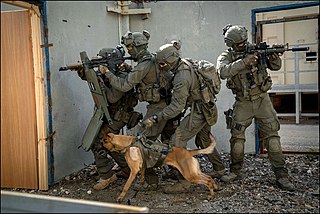
Counterterrorism, also known as anti-terrorism, incorporates the practice, military tactics, techniques, and strategy that government, military, law enforcement, business, and intelligence agencies use to combat or prevent terrorism. Counter-terrorism strategy is a government's plan to use the instruments of national power to neutralize terrorists, their organizations, and their networks in order to render them incapable of using violence to instill fear and to coerce the government or its citizens to react in accordance with the terrorists' goals.
An insurgency is a violent, armed rebellion against authority waged by small, lightly armed bands who practice guerrilla warfare from primarily rural base areas. The key descriptive feature of insurgency is its asymmetric nature: small irregular forces face the state's large, well-equipped, regular military. Due to this asymmetry, insurgents avoid large-scale direct battles, opting instead to blend in with the civilian population where they gradually expand territorial control and military forces. Insurgency frequently hinges on control of and collaboration with local populations.
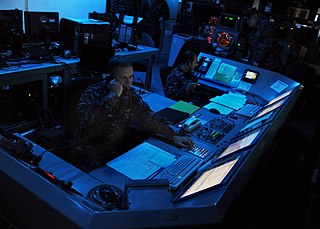
Military operations other than war (MOOTW) focus on deterring war, resolving conflict, promoting peace, and supporting civil authorities in response to domestic crises. The phrase and acronym were coined by the United States military during the 1990s, but it has since fallen out of use. The UK military has crafted an equivalent or alternate term, peace support operations (PSO). Both MOOTW and PSO encompass peacekeeping, peacemaking, peace enforcement and peace building. The People's Liberation Army developed a similar concept based off MOOTW, known as "Non-War Military Activities," which expanded on MOOTW and includes a range of activities characterized as "Confrontational," "Law Enforcement," "Aid & Rescue," or "Cooperative" in nature.

The United States Southern Command (USSOUTHCOM), located in Doral, Florida in Greater Miami, is one of the eleven unified combatant commands in the United States Department of Defense. It is responsible for providing contingency planning, operations, and security cooperation for Central and South America, the Caribbean, their territorial waters, and for the force protection of U.S. military resources at these locations. USSOUTHCOM is also responsible for ensuring the defense of the Panama Canal and the canal area.

Counterinsurgency (COIN) is "the totality of actions aimed at defeating irregular forces". The Oxford English Dictionary defines counterinsurgency as any "military or political action taken against the activities of guerrillas or revolutionaries" and can be considered war by a state against a non-state adversary. Insurgency and counterinsurgency campaigns have been waged since ancient history. However, modern thinking on counterinsurgency was developed during decolonization. Within the military sciences, counterinsurgency is one of the main operational approaches of irregular warfare.
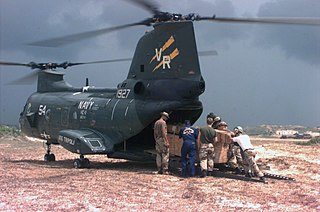
The Unified Task Force (UNITAF) was a United States-led, United Nations-sanctioned multinational force which operated in Somalia from 5 December 1992 until 4 May 1993. A United States initiative, UNITAF was charged with carrying out United Nations Security Council Resolution 794 to create a protected environment for conducting humanitarian operations in the southern half of the country.
Military aid is aid which is used to assist a country or its people in its defense efforts, or to assist a poor country in maintaining control over its own territory. Many countries receive military aid to help with counter-insurgency efforts. Military aid can be given to a rebellion to help fight another country. This aid may be given in the form of money for foreign militaries to buy weapons and equipment from the donor country.

Visit, board, search, and seizure (VBSS) is the term used by United States military and law enforcement agencies for maritime boarding actions and tactics. VBSS teams are designed to capture enemy vessels, combat terrorism, piracy, and smuggling, and to conduct customs, safety and other inspections.
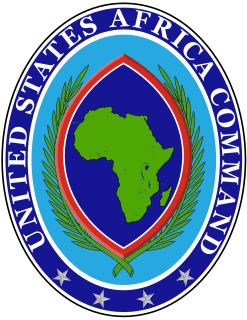
The United States Africa Command, is one of the eleven unified combatant commands of the United States Department of Defense, headquartered at Kelley Barracks, Stuttgart, Germany. It is responsible for U.S. military operations, including fighting regional conflicts and maintaining military relations with 53 African nations. Its area of responsibility covers all of Africa except Eritrea, which has denied interest of becoming a member for years. It also does not cover Egypt, which is within the area of responsibility of the United States Central Command. U.S. AFRICOM headquarters operating budget was $276 million in fiscal year 2012.
The United States government first recognized the usefulness of foreign aid as a tool of diplomacy in World War II. It was believed that it would promote liberal capitalist models of development in other countries and that it would enhance national security.
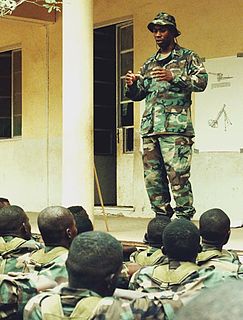
Foreign internal defense (FID) is a term used by the militaries of some countries, including the United States, France, and the United Kingdom, to describe an integrated and synchronized, multi-disciplinary approach to combating actual or threatened insurgency in a foreign state. This foreign state is known as the Host Nation (HN) under the US doctrine. The term counter-insurgency is more commonly used worldwide than FID.
Irregular warfare (IW) is defined in United States joint doctrine as "a violent struggle among state and non-state actors for legitimacy and influence over the relevant populations." Concepts associated with irregular warfare are older than the term itself.
Defense Support of Civil Authorities (DSCA) is the process by which United States military assets and personnel can be used to assist in missions normally carried out by civil authorities. These missions have included: responses to natural and man-made disasters, law enforcement support, special events, and other domestic activities. A recent example of the use of DSCA is the military response to Hurricane Katrina. DSCA is the overarching guidance of how the United States military can be requested by a federal agency and the procedures that govern the actions of the military during employment.
Japanese military operations other than war (MOOTW) focus on deterring war, resolving conflict, promoting peace, and supporting civil authorities in response to domestic crises.
Chinese military operations other than war (MOOTW) focus on deterring war, resolving conflict, promoting peace, and supporting civil authorities in response to domestic crises.

The Maritime Civil Affairs and Security Training Command (MCAST) provides personnel, trains, equips and deploys U.S. Navy sailors for a task force commander to establish and enhance relations between military forces, governmental and nongovernmental organizations and the civilian populace. Accomplished in a collaborative manner across the spectrum of operations in the maritime environment, MCAST Command executes civilian to military operations and military to military training, as directed, in support of security cooperation and security assistance requirements.
The Joint Theater Level Simulation (JTLS) is used to simulate joint, combined, and coalition civil-military operations at the operational level. Used for civil/military simulations and humanitarian assistance/disaster relief (HA/DR) scenarios, JTLS is an interactive, computer-assisted simulation that models multi-sided air, ground, and naval resources with logistical Special Operation Forces (SOF) and intelligence support. The primary purpose of JTLS is to create a realistic environment in which agency staff can operate as they would within a real-world or operational situation. A training audience conducts a scenario or event to practice their ability to coordinate various staff functions.

The United States Special Operations Command is the unified combatant command charged with overseeing the various special operations component commands of the Army, Marine Corps, Navy, and Air Force of the United States Armed Forces. The command is part of the Department of Defense and is the only unified combatant command created by an Act of Congress. USSOCOM is headquartered at MacDill Air Force Base in Tampa, Florida.

Dongmyeong Unit is one of the UN Peacekeeping Forces sent to Lebanon by the Republic of Korea Armed Forces (ROKA). It was formed on 21 June 2007. The conflict in Lebanon began in 1975, after an outbreak of armed clashes between Christians and the Lebanese, Syrian and Israeli militaries leading into the Lebanese Civil War. To prevent ongoing hostilities, the United Nations passed United Nations Security Council (UNSC) resolutions 425 and 426, activating the United Nations Interim Force in Lebanon (UNIFIL). As part of its contribution to UN forces, the Republic of Korea sent the Dongmyeong Unit as a rotational force to Lebanon in July 2007. The Dongmyeong Unit consisted of 300 people, including one battalion of Korean Special Forces and specialist troops filling various roles including engineering, communications, transport, maintenance and medical support.

These are overseas dispatches of the Japan Self-Defense Forces (JSDF). Japan sought active international cooperation beyond the framework of previous activities due to the alleviation of tensions after the end of the Cold War in 1989 and the Gulf War that broke out at the beginning of 1991. This began the dispatch of the Self-Defense Forces in the Persian Gulf.












